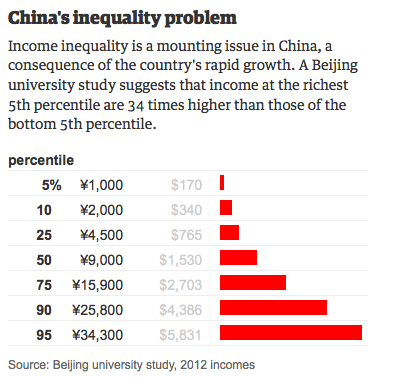Perhaps you will reassess your opinion after reading a report from The Guardian.
More than a dozen family members of China’s top political and military leaders are making use of offshore companies based in the British Virgin Islands, leaked financial documents reveal.
The brother-in-law of China’s current president, Xi Jinping, as well as the son and son-in-law of former premier Wen Jiabao are among the political relations making use of the offshore havens, financial records show. …
… The disclosure of China’s use of secretive financial structures is the latest revelation from “Offshore Secrets”, a two-year reporting effort led by the International Consortium of Investigative Journalists (ICIJ), which obtained more than 200 gigabytes of leaked financial data from two companies in the British Virgin Islands, and shared the information with the Guardian and other international news outlets.
In all, the ICIJ data reveals more than 21,000 clients from mainland China and Hong Kong have made use of offshore havens in the Caribbean, adding to mounting scrutiny of the wealth and power amassed by family members of the country’s inner circle.
As neither Chinese officials nor their families are required to issue public financial disclosures, citizens in the country and abroad have been left largely in the dark about the elite’s use of offshore structures which can facilitate the avoidance of tax, or moving of money overseas. Between $1tn and $4tn in untraced assets have left China since 2000, according to estimates.
 And if you think a communist system leads to greater “spreading of the wealth,” consider the chart at the right.
And if you think a communist system leads to greater “spreading of the wealth,” consider the chart at the right.
This information brought to mind the following passage from a 2011 Daily Journal column focusing on “the right recipe for the poorest of the poor.”
Split nations into four groups based on economic freedom, and calculate the share of income earned by the poorest 10 percent. In the most economically free countries, the “bottom 10 percenters” earn 2.6 percent of the nation’s income. That sounds bad? In the least free countries, the “bottom 10 percenters” collect 2.4 percent of the nation’s income.
Maybe there’s a sweet spot between the most free and least free countries. We don’t want to be North Korea, but too much freedom is bound to lead to too much income inequality. Like Goldilocks, we should pursue the level of freedom that’s neither too hot nor too cold, but just right. Except that the “bottom 10 percenters” earn about the same amount in the middle quartiles as well: 2.2 percent and 2.3 percent.
In other words, the poorest members of society earn about the same percentage of a nation’s income regardless of economic freedom. Free or unfree, they’re unlikely to get much more than an average of 2.5 percent of that income. In other words, they can expect to get about 2.5 percent of the economic pie — regardless of the pie’s size.
So how do they get more pie? Only when their nation bakes a larger pie. …
… The main ingredient is economic freedom. The poorest of the poor in the most economically free nations — those ranked in the top 25 percent in terms of freedom —earn eight times as much annual per capita income ($8,735) as those in the least free nations ($1,061). The contrast is pronounced even when the comparison pits the freest nations against those that are slightly less free. Slip from the top quartile to the second quartile of the economically free countries, and annual average per capita income drops by more than 60 percent, to $3,311.


